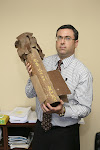As tensions continue to mount between Iran and Israel, Dan Raviv and Yossi Melman offer detailed reporting on how Israel's intelligence agency operates inside Iran.
There've been more than a few reports suggesting that Israel's foreign intelligence agency - the Mossad - hires Iranian dissidents to carry out sabotage and assassinations inside Iran.
But a study of fifty years of assassinations by the Mossad - including conversations with current and former operatives and those who work with them in countries friendly to Israel - yields the conclusion that the assassins inside Iran are Israelis.
The Mossad has a special operations unit - a kind of Mossad within the Mossad - called Kidon (the Hebrew word for bayonet), which has over the years developed unique methods for infiltrating enemy countries, and for murdering Israel's enemies without leaving a trace.
The Mossad benefits from unmatched linguistic capabilities, in part because Israel has many citizens whose families moved from Arabic- or Persian-speaking countries. Israeli operatives have traveled into Iran using the passports of other countries, including bogus documents produced by skilled Mossad forgers, and genuine passports where the photographs might be altered slightly.
Insight into the psyches and behavior of members of the super-secret Kidon squad can be found - perhaps surprisingly - in the pages of a novel called "Duet in Beirut," published only in Hebrew (in 2002), by Mishka Ben-David, a former intelligence officer in the Mossad's operations department, which runs and coordinates Kidon.
From the book and other sources it is understood that Kidon is so compartmentalized that its office is not inside the Mossad headquarters. Kidon combatants - who dubbed themselves "The Team" - hardly ever go there. Even when interacting with Mossad operatives from other units, Kidon men use assumed names. In the field, members use a third name - and sometimes even fourth and fifth identities.
Their training includes almost anything one might imagine is needed for an intelligence operation: surveillance, shaking off surveillance, studying objects and memorizing everything about them. They become proficient at remembering codes and securely communicating during missions without raising suspicion.
Because they are the cream of the crop, Kidon men and women are the ones the Mossad director selects for very dangerous missions - including complex operations of an information-gathering nature - that require top professionals.
Despite tactical successes in Iran in recent years, the Mossad and its top political master, Prime Minister Benjamin Netanyahu, know that the entire Iranian nuclear weapons program will not be demolished by assassinations of nuclear scientists and military officers.
Yet, any delay in Iran's nuclear work represents an achievement. Israeli strategic thinking (exercised in Egypt, Syria, Iraq, and elsewhere) holds that temporary disruptions to an enemy's dangerous projects are sufficient cause for taking significant risks.
Ex-Mossad chief Meir Dagan.
(Credit: CBS News)
But the intimidating impact that Dagan aimed to create in Iran seems to be exhausted. This is reportedly apparent to Tamir Pardo, the new head of the Mossad, who has a reputation for knowing that one should not push one's luck. Iran is becoming more dangerous for Mossad and other foreign intelligence operatives. One can expect a halt, at least temporarily, of the assassination campaign.
Dagan, in retirement, has become outspoken in his opposition to a military strike by Israel against Iran. When he spoke to Lesley Stahl on CBS's "60 Minutes" in March, Dagan warned that retaliation by Iran and its proxies could be highly damaging to normal life in the Jewish state. Dagan also believes that an attack by Israel would unite most Iranians around their regime and would give Iran's scientists and engineers a major reason to speed up their underground nuclear work.
His private advice boils down to pointing out that there is still plenty of disruption to be accomplished within Iran by sabotage, assassinations, and a truly innovative weapon - cyberwarfare. The worm called Stuxnet that took over Iranian nuclear lab computers was a product of Israeli and U.S. intelligence agencies working together; and it was not the only computer virus created by the highly skilled programmers in both nations.
While Prime Minister Netanyahu and Defense Minister Ehud Barak seem skeptical that international economic sanctions will persuade Iran to cancel its nuclear bomb program, Dagan and other former and current intelligence officials believe that sanctions are biting and could be a major factor in the ayatollahs' thinking.
Only last week, most of Europe stopped purchasing Iranian oil. Tension in the Middle East is likely to rise, and predicting when - or how - the crisis over Iran may be resolved is truly impossible. There is a high likelihood, however, that the Mossad - and its even more secretive Kidon unit - will somehow be involved.

